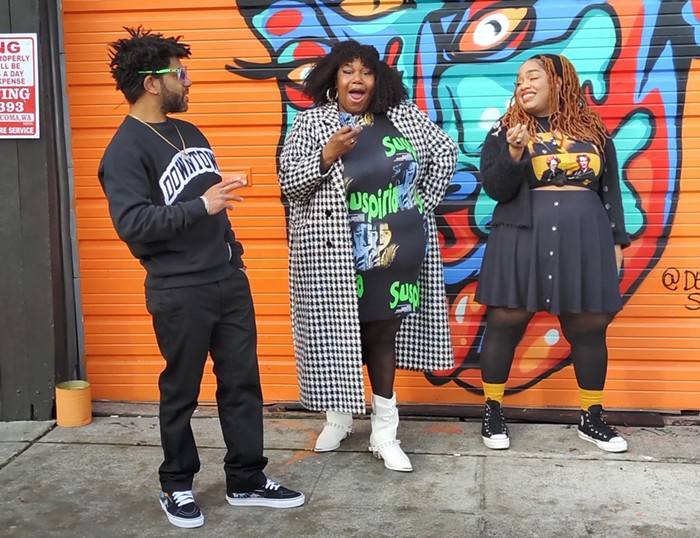Vicki Christophersen is the most powerful person working in cannabis in Washington State, at least if you listen to her critics.
"She controls everything." "Vicki passed that bill." "That law only died because Vicki didn't like it."
Those are all real quotes from different industry players I've interviewed over the years. Christophersen is not a lawmaker, nor is she head of the Washington State Liquor and Cannabis Board (WSLCB). She's something that might have more enduring power: a formidable lobbyist and the executive director of the Washington CannaBusiness Association (WACA), the state's powerful pot trade group.
She says her critics overstate her power, but it's undeniable that she has more influence than just about anyone else. Twenty years ago, before she was making more than half a million dollars a year walking the halls of Olympia, she was working as a middle-school teacher in Seattle, thinking that was her "lifelong career."
Then her mother got involved.
"I had been pretty politically active in my teaching, just in education issues, and she kept bugging me," Christophersen said over coffee recently. "She kept saying, 'I think you would be good at this.'"
Mothers are always right, and Vicki's mom, who was one of Olympia's first female lobbyists, was right about Vicki. Nearly two decades after going to Olympia, Christophersen is one of the highest-paid lobbyists in the capital. The $612,150 she's made in the last 12 months, according to state records, includes more than $63,000 from the Association of Washington Spirits and Wine Distributors, $60,000 from the College Board nonprofit, and $48,000 from the Merck pharmaceutical company. And that doesn't include the money she makes as WACA's executive director.
Christophersen's impact on the state's weed laws has often angered longtime cannabis advocates. She worked on a 2016 law that shut down the state's old medical marijuana dispensary system, which thoroughly pissed off that community. More recently, she spearheaded this year's compliance reform bill that radically reduced the WSLCB's penalties for when it finds a pot business has broken the rules.
At one point, as the legislature was debating the compliance reform bill, 10 lawmakers sent a letter to Governor Jay Inslee calling on him to oust one of the WSLCB's board members after that board member testified against the legislation. Some observers believed the letter was Christophersen's doing, something she denies: "I wasn't telling them to send a letter, but I was very involved in asking them to get involved and weigh in, which is a very common thing."
The board member kept his job, but Christophersen got her bill passed over his objections, something she said was her "proudest achievement in my career... We took on a state agency, that is an unusual thing to do."
When she's not taking on the WSLCB, she's often working closely with the agency to shape its rules. For example, this is how board members Russ Hauge, Ollie Garrett, and Jane Rushford discussed Christophersen during a public board meeting in January of 2018, just as they were contemplating the impact of a new policy.
Hauge: "I'll be meeting with Vicki this afternoon."
Garrett: "We both are."
Rushford: "I met with her yesterday."
Garrett: "But why is she needing to have individual meetings with us?"
Rushford: "She didn't want to have an open public meeting exposure on some of the things."
Christophersen's critics paint this access as an example of her having power over the WSLCB, something she says isn't accurate: "I'm flattered that people think I'm that powerful, but it's just not the case. The fact is, what I do for a living is meet with people."
And that is the work of a lobbyist—they spend months in close proximity with lawmakers and power brokers trying to advance their interests. Unfortunately, it's not unheard of for lawmakers to abuse these relationships. More than 170 different women, including 42 legislators from both parties and dozens of lobbyists, wrote a letter in 2017 calling for changes in Olympia, saying women in the state capital are subject to "a range of dehumanizing behavior—from innuendo to groping, from inappropriate comments and jokes to unwanted touching and assault."
Christophersen told me she has been subject to "inappropriate advances" from lawmakers, but she did not herself sign the letter. "During the time of that letter being circulated, I had to debate for quite a while with myself, and I ultimately didn't sign it," Christophersen said. "It wasn't because I didn't believe there were issues that needed to be addressed. I felt like the letter was too one-sided. It didn't account for the complexity of the environment."
Christophersen said Olympia's biggest problem was the requirement that people report inappropriate behavior to the legislature's party leadership. A process like that does not create a safe space to report inappropriate behavior. Christophersen said the state capital, just like any high-stress environment where people are in close proximity, needs a non-partial authority to keep people in line.
In other words, the halls of government are no different than a middle school. "Teaching middle school really did actually prepare me for Olympia, because it is like a big school, sometimes like a middle school, in terms of how people act."
A middle school where you get paid more than $600,000 to help shape the future of policy in Washington State.

















